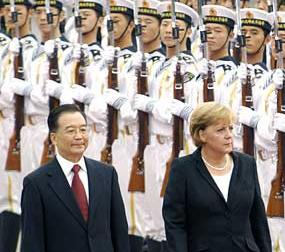Developments during the past month suggest that relations between China and major European governments will remain problematic for the next few years. Chinese and European officials have engaged in disputes on several important issues that could prove difficult to resolve. Nevertheless, the governments of China and Europe also share important interests that should limit the impact of these conflicts. Many of the differences between China and Europe became apparent during German Chancellor Angela Merkel's three-day visit to China at the end of August. The itinerary for Merkel's second trip to China as chancellor included stays in Beijing and Nanking. In Beijing, she held talks with President Hu Jintao, Prime Minister Wen Jiabao, and other Chinese officials. As head of both the G-8 as well as Europe's largest economy, Merkel represents Beijing's most important commercial and political partner in Europe. From Berlin's perspective, China has surpassed Japan as Germany's most significant economic relationship in Asia. In global terms, however, China will soon overtake Germany as the world's third largest economy after the United States and Japan -- sharpening the competitive undertones of their relationship.
European-Chinese Relations Remain Contentious but Pragmatic

